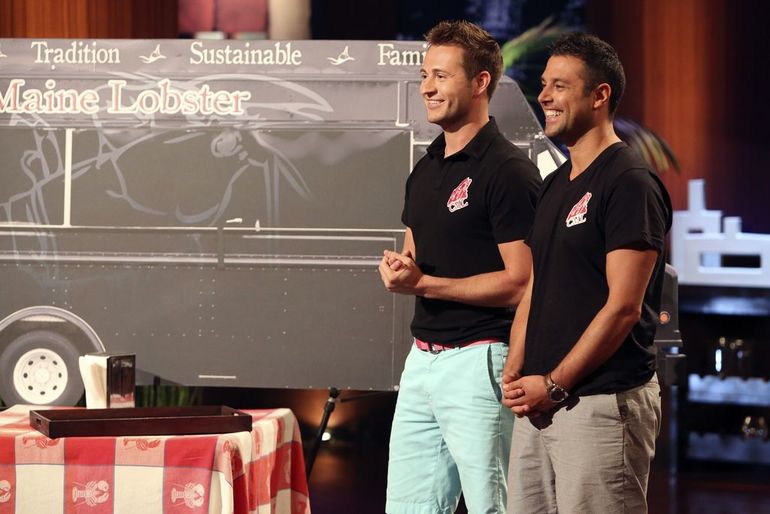Processing Your Payment
Please do not leave this page until complete. This can take a few moments.
- News
-
Editions
View Digital Editions
Biweekly Issues
- December 1, 2025
- Nov. 17, 2025
- November 03, 2025
- October 20, 2025
- October 6, 2025
- September 22, 2025
- + More
Special Editions
- Lists
- Viewpoints
-
Our Events
Event Info
Award Honorees
- Calendar
- Biz Marketplace
Maine food truck claws its way to the top
 (ABC/ADAM TAYLOR)
Cousins Jim Tselikis, left, and Sabin Lomac were featured on ABC's "Shark Tank" last week, pitching their lobster food truck and distribution business to a panel of well-heeled investors. The show netted the duo a $55,000 investment from real estate magnate Barbara Corcoran.
(ABC/ADAM TAYLOR)
Cousins Jim Tselikis, left, and Sabin Lomac were featured on ABC's "Shark Tank" last week, pitching their lobster food truck and distribution business to a panel of well-heeled investors. The show netted the duo a $55,000 investment from real estate magnate Barbara Corcoran.
Growing up in Cape Elizabeth and Scarborough, cousins Jim Tselikis and Sabin Lomac were a little spoiled when it came to lobster. Family gatherings and holidays were only complete with a bubbling pot of the state's favorite crustacean on the stove, something Lomac missed after moving to Los Angeles eight years ago.
But earlier this year, Maine's flagship seafood became more than just a fond memory for the cousins who started a food truck business featuring Maine lobster in L.A. Now they are shooting to become the top purveyors of Maine lobster on the West Coast.
"When you're talking about the best athletic shoes, it's Nike or Adidas. When you want steaks, it's Omaha, but it's hard for people to name a seafood provider on the West Coast," says Lomac. "We want to be the face and the name of that industry and we want it to come from Maine."
To that end, the duo appeared last week on the ABC reality show "Shark Tank," where entrepreneurs pitch their business and seek capital from a board of seasoned and well-heeled investors, including the likes of Dallas Mavericks owner Mark Cuban and real estate magnate Barbara Corcoran.
The investors initially balked at the math behind the cousins' proposal to sell a 5% stake in the fledgling company for $55,000, a figure that would put Cousins Maine Lobster's valuation at over $1 million.
"You are very greedy crustaceans," said investor Kevin O'Leary, who declined to make an investment offer.
The cousins were, however, courted by investor Robert Herjavec, who offered $100,000 for a 25% stake, a larger-than-requested figure that he said would help the company grow from its one-truck status to multiple food trucks. The cousins declined the offer, citing the desire to keep closer control of their company.
"You often see the sharks getting away with 35% or 40% of a company. We had no intention of doing that," says Tselikis. "We didn't go in wanting money, we wanted to give away as little equity as possible."
It's Corcoran who made the cousins a deal they liked, offering $55,000 for a 15% stake in Cousins Maine Lobster. The deal has already meant more than just capital, Tselikis says.
"Barbara has been phenomenal," says Tselikis. "We spent the weekend together in New York City recently, and we talk just about every other day. Her connections are endless — the CEOs and CFOs that we've been in front of never would have happened without her."
The eight-minute TV segment has kept the business on the fast-track. Two months after opening, the duo had recovered their $65,000 investment on the mobile eatery and their additional $35,000 in startup costs, posting $150,000 in revenue. Daily, 100 to 150 Cousins lobster rolls were hitting the streets around L.A., with the duo relying on social media to let customers know where they would be parking their enterprise-on-wheels.
That success was the basis for giving Cousins Maine Lobster a permanent home in September in downtown Pasadena, where the owners opened a restaurant.
"People had to chase down the truck sometimes because you're by the beach today but might not be back there for another week or so," Tselikis says. "We wanted to get a location where people could always find us."
Tselikis says that the expanded, and stationary, kitchen also gives them a place to experiment and expand offerings beyond lobster rolls, lobster bisque and lobster tacos to dishes like lobster Cobb salad, BLTs and lobster macaroni and cheese.
But they aren't done. Tselikis and Lomac have set their sights on a nationwide lobster distribution business, promising customers the same prompt delivery of fresh Maine lobster that they say has been crucial to their eateries' success.
The marketing bump from the recent television appearance and Corcoran's expertise and connections are important to the company's future, Tselikis says, and will help the team launch the distribution business quicker than expected.
"That's where [Corcoran will] be really influential, in terms of getting national exposure and [connections] with some companies we can't yet mention," says Tselikis, vaguely citing a few "big online companies" as potential partners.
The cousins are also looking to eventually franchise the food truck operation, with hopes of establishing a presence in cities like San Francisco and Austin.
"It's an easy model to duplicate," says Lomac.
Tselikis says the company's family brand and the freshness of their Maine import — the company ships lobster meat from its Biddeford distribution facility every day — were central to the food truck business taking off.
"Our whole vision was being able to provide people in California with access to this product we were privy to growing up in Maine," says Tselikis, who also imports Maine-made hot dog rolls to California.
After six months of research on competition, clientele and supply chain, the duo launched Cousins Maine Lobster, a single food truck offering fresh Maine lobster rolls, tacos and skewers at parking lots, street festivals and other area hotspots.
"We wanted to make it as authentic as possible. When people come from the East Coast, they kind of like to challenge us and say 'your stuff better be good,'" Lomac says.
But marketing the $13 lobster roll to those "from away" was a little more difficult. While lobster is known the world-over as a luxury foodstuff, Tselikis said West Coasters aren't always aware of just what they are getting.
"We fight against the fact that not all Californians understand the delicacy and the true cost of lobster products," Tselikis says. "But when we get Mainers and New Englanders out there, they say, 'wow, you should be charging more for this.'"
With strong roots in Portland, Tselikis says he and Lomac have talked about expanding back to their home turf, but not in the near future.
"It's a saturated market, which is why we didn't start here, so it's not on the 2013 schedule, but you've got to be where you came from eventually," says Tselikis.
But there's at least one caveat to starting up a food truck business in Maine, Lomac points out.
"As long as it has a snow plow on it."
Read more
Mainebiz web partners

The Giving Guide
The Giving Guide helps nonprofits have the opportunity to showcase and differentiate their organizations so that businesses better understand how they can contribute to a nonprofit’s mission and work.
Learn More
Work for ME
Work for ME is a workforce development tool to help Maine’s employers target Maine’s emerging workforce. Work for ME highlights each industry, its impact on Maine’s economy, the jobs available to entry-level workers, the training and education needed to get a career started.
Learn More
Groundbreaking Maine
Whether you’re a developer, financer, architect, or industry enthusiast, Groundbreaking Maine is crafted to be your go-to source for valuable insights in Maine’s real estate and construction community.
Learn more-
The Giving Guide
The Giving Guide helps nonprofits have the opportunity to showcase and differentiate their organizations so that businesses better understand how they can contribute to a nonprofit’s mission and work.
-
Work for ME
Work for ME is a workforce development tool to help Maine’s employers target Maine’s emerging workforce. Work for ME highlights each industry, its impact on Maine’s economy, the jobs available to entry-level workers, the training and education needed to get a career started.
-
Groundbreaking Maine
Whether you’re a developer, financer, architect, or industry enthusiast, Groundbreaking Maine is crafted to be your go-to source for valuable insights in Maine’s real estate and construction community.
ABOUT
NEW ENGLAND BUSINESS MEDIA SITES
No articles left
Get access now
In order to use this feature, we need some information from you. You can also login or register for a free account.
By clicking submit you are agreeing to our cookie usage and Privacy Policy
Already have an account? Login
Already have an account? Login
Want to create an account? Register
Get access now
In order to use this feature, we need some information from you. You can also login or register for a free account.
By clicking submit you are agreeing to our cookie usage and Privacy Policy
Already have an account? Login
Already have an account? Login
Want to create an account? Register







Comments